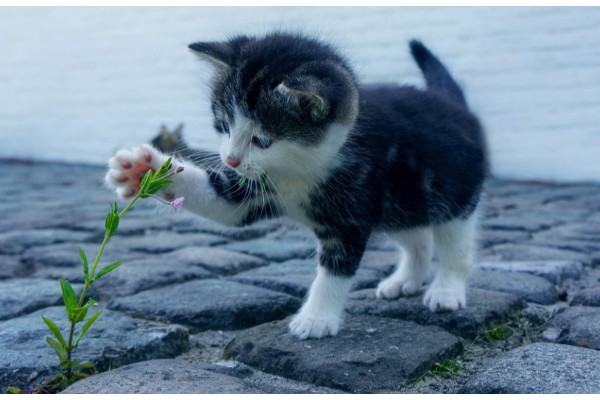It’s important to keep in mind that if your kitten is crying o, there must be a need that must be met. Your kitten may be lonely, hungry, in pain, or at risk, and need you to soothe immediately.
Table of Contents
6 Reasons Why Your Kitten Is Crying
1. Your Kitten Is Lonely
A kitten needs a lot of mental and physical stimulation while they are awake in order to be happy because they are curious and energetic creatures. If a kitten is constantly crying, especially if they were just adopted, they might be trying to get your attention or calling out to another kitten or their mother.
For your new kitten’s daily playtime, be sure to block off plenty of time. You might want to think about adopting another kitten so that the felines can socialize with one another if you have the resources and are prepared to make the commitment. Many professionals strongly advise adopting kittens in pairs.
2. Your Kitten Is Lost or Confused
New kitten parents might be tempted to give the kitten complete control of the home, but a young animal may find having such a large territory confusing or even frightening. A crying kitten might be lost and calling out for assistance because she cannot recognize her environment or because she is unsure of how to return to the litter box or cat bed.
New adopters should give kittens a smaller “home base” for the first week or two so that the feline can comfortably acclimate to the space. The kitten can gradually be given access to more and more of the house once she feels secure in her new surroundings.

3. Your Kitten Is Hungry
When there has been an extended period of time without food, kittens, like human babies, are likely to cry out. Consider your feeding schedule and check to see if you are feeding your cat frequently enough and if it is crying out for food every day.
Young kittens grow quickly, so it’s important to feed them plenty of wet food to promote growth. While an adult cat may benefit from a strict feeding schedule, kittens must be fed when they are truly hungry. If you believe that a kitten is crying out for food, up the amount or frequency of feeding. It is more reasonable to anticipate that a kitten will be able to adhere to a feeding schedule once it is 3 or 4 months old.
4. Your Kitten Needs to Poop
It’s normal for kittens to be a little fussy about pooping when they first get used to using a litter box on their own. When a kitten is under 8 weeks old, it’s normal for him to meow prior to or during urination as long as he’s not in pain or discomfort.
Bring the kitten to the veterinarian if she is whining or struggling to use the litter box, or if she is crying out every time she popped to make sure there isn’t a medical problem lurking beneath. Don’t wait to get the kitten’s medical attention if you suspect that it is ill if you notice constipation, diarrhea, or other gastrointestinal issues, especially in a young kitten.
5. Your Kitten Is in Pain
An injured animal’s shrill cry can be difficult to miss, so you’ll know it when you hear it. A kitten is in serious distress if her cry is piercing and shrill. This can happen for a variety of reasons, such as when a limb becomes uncomfortable or when the tail is unintentionally stepped on.
Address the pain’s source right away, then evaluate the situation to determine whether additional care is necessary. If you believe the kitten has an injury, consult a veterinarian right away.
6. Your Kitten Is Sick
The somber cries of a kitten may be a sign of illness. While a kitten’s cries can reveal that something is upsetting her, illness may not always be visible to a caretaker. You should seek medical attention right away if a kitten is crying and appears vacant or exhausted.
Keeping in mind that cats and kittens sometimes don’t vocalize their distress is also crucial. In most cases, rather than crying, illness manifests as a lack of energy or silence. The most crucial thing for kitten parents to remember is to always be on the lookout for any sudden changes in a kitten’s behavior, whether they involve loud cries or withdrawal into silence.

How To Soothe A Crying Kitten
Understanding your kitten’s nutritional and developmental needs during their first months will help you figure out why they’re crying. Here are some typical causes of crying in kittens at various ages, along with some soothing techniques.
Newborn To 8 Weeks
Kittens are born blind and hearing-impaired. According to the ASPCA, it’s typical to hear baby kittens meowing or crying during their first few weeks of life because they need food and warmth. In order to nurse and stay warm, kittens typically stay with their mothers until they are 8 weeks old. Usually, weaning begins at around 4 weeks and lasts for 4-6 weeks. The kitten may cry at first as a result of their mother not being present to assist with feeding when they first begin weaning. You will need to step in if the kitten is younger than 8 weeks old and the mama cat isn’t around to help.
How to help: Best Friends Animal Society emphasizes that kittens shouldn’t be given cow’s milk. Feed them a kitten-specific formula via a bottle instead. In addition, Best Friends recommends that kittens up to the age of four weeks stay in a cat carrier or other secure container with plenty of blankets or towels to keep them warm when you’re not feeding them. An additional choice is to give them a heating pad made especially for kittens.
8 Weeks To 6 Months
A kitten’s baby teeth erupt between four and six weeks after birth, but adult teeth begin to erupt between four and six months. According to Greencross Vets, teething doesn’t always hurt, but it can make your kitten sensitive and irritable, which might make them cry. Contact your veterinarian right away because your cat might need treatment if the crying is accompanied by red, swollen gums with discharge.
6 Months To Adulthood
Your kitten will start to settle down and unwind as they approach adolescence and adulthood. It is crucial to reevaluate your cat’s litter box as it grows to adult size. It’s crucial to take your cat to the vet for an examination if you notice them crying before, during, or after using the litter box. It’s possible that painful urination or defecation caused a cat to vocalize in the litter box.
How to help: Having your pet examined by a veterinarian is the first thing to do if your cat or kitten is crying or acting distressedly at the litter box. Nevertheless, it is advised for all cats, even those that are healthy, to provide a secure, hygienic, and welcoming space for them to relieve themselves. Make sure your cat can fit in the litter box and that they enjoy the litter. It is generally advised to have a litter box that is 1.5 times as long as your cat, and it must be simple to enter. Keep the area neat and tidy and make sure to scoop every day.
You want to do everything you can to comfort your crying kitten. You can try some of these suggestions supported by experts once you identify what’s causing the depressing meows.

Figure Out The Root Cause Of Crying
When your kitten cries, it’s sad, so it makes sense that you’d want to put an end to it right away. Identifying the cause of your kitten’s crying is the first step. Stress, coldness, hunger, and illness are just a few of the causes that could exist. Once you know what is causing the crying, you can make your cat feel better. One way to keep their content and strengthen your relationship with them is to play with them. Have chew toys on hand for your cat when they are teething to help with pain relief. Make sure your cat’s water and food bowls are accessible and full, and that their litter box is the appropriate size for their developing body. If you believe your cat is ill or if you’re unsure of what’s wrong, call your veterinarian. They can help because they’ve seen it all.
Kitten Care Tips
Plenty of play sessions
Your kitten will sleep better and experience less stress if you play with them. Playtime is a great opportunity to strengthen relationships. Your kitten will experience less anxiety in their forever home the more at ease they become with you.
Make sure the kitty’s necessities are easily accessible
Choose one location and keep the food and water dishes, litter box, and other necessary items there. Make sure that these items are accessible and not hidden in high shelves or obscured areas of the house. Try hiding them in open areas where your cat can easily find them.
Invest in chew toys
In addition to being enjoyable, toys can ease teething discomfort. During the teething period, give your cat two 15-minute sessions with rubber or plastic toys.
Check your kitten’s dishes
Your kitten might require food and water. Check to see if their dishes are empty, and if they are, fill them up. Regarding how much food you should give them each day, abide by your veterinarian’s recommendations.
Get a larger litter box
It’s possible that your kitten will need a larger litter box as they get bigger. They frequently require a longer one of between 9 and 16 weeks, and it’s a good idea to evaluate it for the first year.
When To Call The Vet
Speak with your veterinarian or an on-call emergency vet if your kitten’s crying doesn’t stop or if you notice any additional signs of distress, such as lethargy, vomiting, diarrhea, decreased appetite, or excessive grooming.
As your cat develops into a boisterous adolescent and beyond, its meows and cries will change. Keep the lines of communication open by hearing them out, speaking back, and being incredibly loving.
